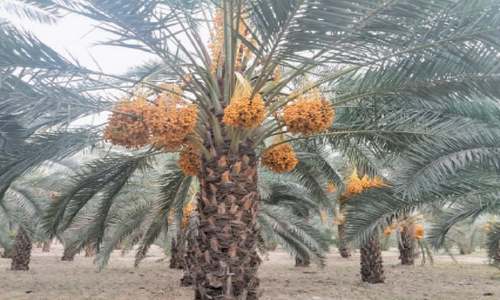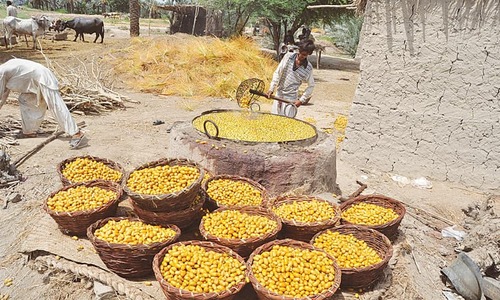Pakistan is the fourth largest date producer in the world. The annual date production in Pakistan is estimated to be between 550,000 and 650,000 metric tonnes (MT). Sindh produces around 50 per cent of Pakistan’s dates, with Khairpur Mir’s date palms contributing 90pc of the total.
Date production in Sindh is pivotal in the region’s agricultural economy, contributing significantly to local consumption and export earnings. The province, particularly the Khairpur district, is one of the largest producers of dates in the country, supplying a substantial portion of Pakistan’s overall date output.
Despite these advantages, the full potential of Sindh’s date industry remains underutilised, primarily due to limitations in post-harvest management, processing facilities, and market access, which have hindered the development of a robust value-added sector.
Post-harvest management includes immediately sorting, cleaning, and grading dates to remove damaged or poor fruit. This stage is crucial for keeping quality and reducing post-harvest losses. Date palm harvesting often occurs during the monsoon rains from July to September in this region. Monsoon rains can quickly destroy 90pc of dates, making it difficult to salvage them from the rain.
Post-harvest losses are about 20-30pc at different stages of operation, significantly reducing farmers’ marketable surplus and profitability and preventing them from creating diverse high value products
In Khairpur, traditional sun drying is a common practice where dates are dried on mats spread out in open sun spaces for natural dehydration. Most drying grounds are not properly gated. Hence, birds, insects, and other animals can contaminate the dates. Post-harvest losses are about 20-30pc at different stages of post-harvest operation, significantly reducing farmers’ marketable surplus and profitability.
Significant quantities of dates are sold in local markets, where prices vary according to availability and demand. The lack of organised market links leads to inefficiencies, with farmers frequently obtaining lower prices due to middlemen’s domination.
Khairpur Sindh has a limited number of processing facilities, mostly small-scale ones without advanced technology. As a result, most dates are sold raw or have little processing, with little value added.
One of the primary issues is the lack of modern processing facilities, which limits the ability to produce high-quality, value-added products such as date syrup, paste, and powder. This is further compounded by inadequate infrastructure, including poor storage facilities and inefficient transportation networks, leading to significant post-harvest losses.
Additionally, the absence of standardised practices in cultivation and processing results in inconsistent product quality, which affects the marketability of dates both locally and internationally.
However, there are substantial opportunities for upgrading the value chain. Investment in modern processing technologies can enhance product quality and expand the range of date-based products. Improving infrastructure, such as establishing cold storage facilities and efficient logistics, can reduce post-harvest losses and ensure timely market access.
Moreover, introducing quality certification and standardisation processes can boost the competitiveness of dates in international markets. By addressing these constraints and seizing upgrading opportunities,
Another important strategy is the modernisation of agricultural practices. Farmers in Sindh can significantly increase their productivity using high-yield date palm varieties and modern management practices. This transition requires not only the availability of modern farming tools and inputs but also comprehensive training programmes for farmers.
Market access and development are crucial components of the strategy to enhance the competitiveness of Sindh’s date palm products. Despite the high demand for dates, especially in the Middle East and South Asia, the market penetration of Sindh’s dates remains limited.
Developing robust marketing strategies that highlight the unique qualities of Sindh’s dates, such as their organic production or specific taste profiles, can help differentiate them in the global market.
Export-oriented growth should be a priority, with efforts to establish strong trade relations with key importers and participation in international trade fairs to showcase Sindh’s date products. Collaboration and partnerships are vital for the success of any strategy aimed at improving the date palm value chain.
Government agencies, private sector companies, and international organisations must work together to provide the necessary infrastructure, training, and financial support. Implementing targeted financial solutions is essential to support small producers in Sindh’s date industry.
Microfinance programmes offering low-interest, agriculture-specific loans with flexible repayment terms aligned with the harvest cycle can provide much-needed capital for purchasing modern processing equipment and improving infrastructure.
Additionally, subsidised credit facilities backed by government guarantees can reduce risks for banks, making financing more accessible. Forming agricultural cooperatives can further enable small producers to pool resources and access larger collective loans, sharing expensive resources like processing equipment and reducing individual financial burdens.
By focusing on these areas, Sindh can transform its date industry, creating diverse, high-value products that meet international standards and capitalise on emerging market opportunities, ultimately leading to sustainable development in the region.
The writer is the Director of the Pakistan Agricultural Research Council-Social Sciences Research Institute, Tandojam.
Email: aslmemon@hotmail.com
Published in Dawn, The Business and Finance Weekly, September 16th, 2024















































Dear visitor, the comments section is undergoing an overhaul and will return soon.